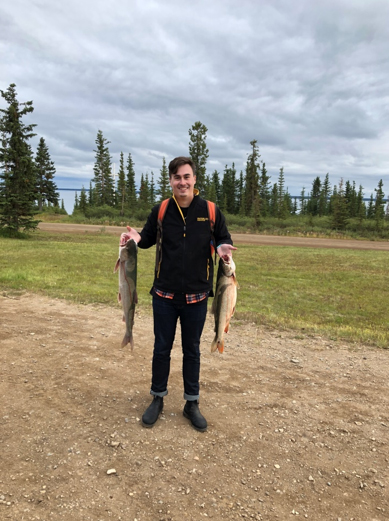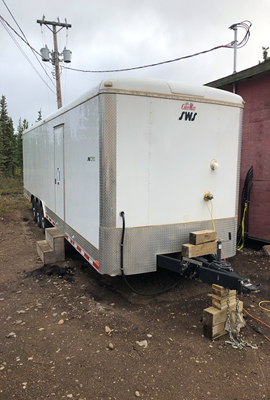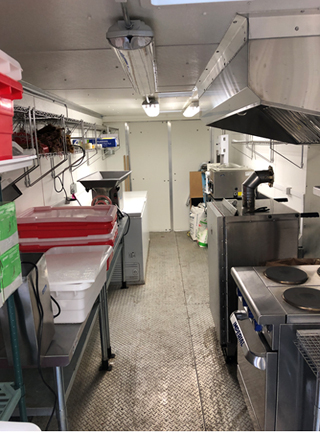|
|

|
  
Features
Update 2020/6/14 Teachers' Hub
brought to you in part by

COUNTRY FOODS AND A RECIPE FOR SUCCESS
By Suzanne Forcese
A remote Indigenous community in Canada’s Northwest Territories; an unused trailer; a second year Masters student; a world renowned research consultant with a PhD in animal Science who has a passion for cooking and helping people in the Arctic; a Laurier researcher whose work explores the challenges and opportunities at the intersection of food security and food sovereignty – these are the main ingredients. By adding a whole lot of trust, respect, and life-long friendships based on shared Traditional and Western Science Knowledge the foundations of a community’s well-being and food security are laid.
Connor Judge, who is in his second year of a Masters Program in Public Health at the University of Waterloo knew his thesis focus would be on policy barriers to accessing traditional food for Indigenous communities but didn’t quite have a handle on the specifics.
WaterToday had the pleasure of speaking with Connor Judge who shared with us an experience that has been life-changing for him.
“I knew I wanted to work on food sovereignty and was just trying to figure out my project when this amazing opportunity fell in my lap.”
Judge’s supervising professor, Dr. Kelly Skinner had just met Dr. Andrew Spring of FLEdGE
A project was waiting to be initiated in Deline.

Connor Judge in Deline
Located in the Northwest Territories, the population of 600 Indigenous people is the only settlement on Great Bear Lake, one of the largest and most pristine freshwater lakes in the world. The lake and surrounding landscape is a source of spiritual well-being, the basis of the community’s food system, and livelihood for the Sahtuot’ine Dene or Bear Lake People.
Climate change is having negative impacts on Deline’s dependency on the traditional food from activities like hunting, fishing, trapping, and gathering from the surrounding boreal forest ecosystem. The Caribou, for instance, have moved on.
“The community is actively implementing self-government, which took effect in 2016. Caribou, which has been a traditional staple in the diet of the Deline community is now on a self-imposed hunting restriction,” Judge told us. “That’s made a big impact in terms of their food system.”
Numerous programs aimed at benefiting the community by creating economic opportunities, employment and food security while adapting to the impacts of climate change have been implemented.
One of the programs was borne out of a meeting between Andrew Spring and Lyle Renecker at an Arctic Net Conference.
“It was discovered,” Judge told WT, that there was an untapped resource that had been sitting unused in Deline since 2012. A trailer. More specifically, a mobile abattoir.
“It is a 27 foot covered flat- bed trailer retrofitted with equipment that you might find in a butcher shop. But nobody in the community had any formal training in how to use it. That’s where Lyle Renecker came in.”
We checked in with Dr. Renecker at his game farm in Stratford. Having been involved in food production and process facility development as well as food safety training with First Nations and Metis peoples he is definitely a fit for Deline’s partnership with FLEdGE and Judge’s research.
“I had been doing a lot of research on reindeer at the University of Alaska,” Renecker told WaterToday in a telephone interview. “While in Alaska, I became involved with processing.” After moving back to Ontario and setting up in game farming, Renecker expanded his expertise working in Africa to create shelf-safe value food and designing mobile processing facilities.
| 
The trailer sat unused in Deline - Photo courtesy Connor Judge |
In 2016 Renecker became involved with a partnership in Inuvik with Country Foods Development Initiative in the Arctic. Renecker managed a resource sustainability and value added processing strategy. And that involved his main passions – cooking and helping people by teaching them how to cook and process and preserve food.
Instruction in food safety, preparation, and preservation of traditional foods took place in a mobile retro-fitted trailer.
The trailer in Inuvik was much like the one sitting unused in Deline. |
“I met Andrew at a conference, got permission to evaluate and retrofit the trailer, and begin 2 weeks of training in August 2019,” Renecker told WT.
“My job,” Judge added, “was the evaluation of the trailer, and informing the community on the best use of the trailer. I also looked at the training itself. Could the 2 weeks training complete all the tasks the community needed to know in order to operate and manage the trailer themselves? I am here to present all the different options for the community, and assist them in making the best decisions. The decisions are always theirs.”
|

Inside the retrofitted trailer - Photo Connor Judge |
Judge’s remaining work on the project is to analyze all policy and the genealogy of that policy. “There are a lot of policies that date back as far as the 1970’s and 80’s and my job is to navigate all the issues related to food safety and risks to health.”
Judge adds that the federal government is aware of the need to update legislation. “Do the policies in place right now apply to an Indigenous self-government? Or for a small remote community?”
Judge hopes that the massive body of policy will become streamlined and current as a result of his research showcasing the Deline project.
|
“A large part of the training for the community involves ‘after harvest knowledge transfer’,” Judge said. “The community prefers to eat caribou but now that is in short supply they are learning how to change their taste preferences. Muskox, for example is a wonderful resource but it has not been their experience to eat it.”
So Renecker created a new experience. Muskox burgers, muskox sausages, pickled muskox, muskox jerky. Along with candied Great Bear trout, moose pâté, firewood jelly and many other new gourmet twists on traditional food. Renecker and his trainees prepared an open house feast for the community. It was a smashing success with everyone savoring new tastes.
While the community is learning about new food sources, ways to enjoy them and preserve them, Connor Judge feels that this experience taught him more than he ever dreamed possible.
“Indigenous culture was never a part of my curriculum in school. Why not? Why did we not learn about residential schools? Why were we not exposed to Traditional Knowledge. I learned more in my 2 weeks in Deline from a kind and welcoming community than I have learned in my entire life.”
As for Renecker who is expecting the Project to continue in several more stages—expanding the trailer, including a flash freezer that would allow winter fishing, and a smokehouse would be part of the next phase. Following that, Renecker envisions training individuals to become trainers themselves and developing a commercial aspect that would also tell the story of Deline.
“I think that what makes this story a success is that we listen, we share, and we allow trust to develop. The ultimate for me is when I get phone calls and texts from my friends in Deline asking for cooking advice. These are friends for life.”
And Connor Judge concludes with a story that says it all.
“During the training one of my duties was to run errands, like getting supplies and driving people from home to the training and back. There was one very lovely and kind Elder that I drove to and from class every day. I learned so much from her in those rides and was invited to her home. She was so welcoming and generous.
On the last day of class I developed a cold and was really feeling quite miserable. The next morning this lovely Elder came to me with a jar of Vicks VapoRub.
She had walked to the store and spent $20 (that she could not afford to spare) on a small over-priced jar so that I would feel better.”
Tears well up in Connor Judge’s eyes with the telling of this incredible bond.
Please enjoy Conner Judge’s video courtesy of Northern Futures Friday Features.
suzanne.f@watertoday.ca
|
|
|
Have a question? Give us a call 613-501-0175
All rights reserved 2025 - WATERTODAY - This material may not be reproduced in whole or in part and may not be distributed,
publicly performed, proxy cached or otherwise used, except with express permission.
|
| |